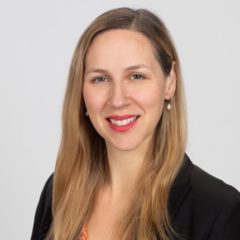19
Jul 2023
Navigating the Waters of Loss
Elisha Gechter
On a cold day in November, I sat in a Harvard square coffee shop feeling like someone was breaking up with me, though not in the romantic sense. In addition to my professional work with Wexner Israel programs at the Harvard Kennedy School, I’m a lay leader, serving as President of the Board of Mayyim Hayyim, a pluralistic mikvah and education center. Our CEO of 11 years was telling me she was ready to step down. In many ways it made sense for her, professionally and personally, and I wanted to be supportive. But, in many ways, I felt challenged in doing so, because I hadn’t envisioned this transition during my final year in the role. I thought my biggest task was going to be finding the next president of the board, not learning to work closely with a new CEO. The two of us had invested effort in our relationship – taking time at the beginning of my three-year term to figure out each other’s working styles had gotten us to a place of open communication and trusted thought partnership. I felt the loss of our connection acutely in that coffee shop, even though there would be more than 6 months until she stepped down. That was the first point of loss I felt in a process that entailed additional points of loss for myself, for the board, and for the staff as we moved from one leader to our next one.
As I write this and reflect on the losses inherent in this process, I am “bein hamitzarim”/ “between the straits” – in the 3 weeks that span the historic breaching of Jerusalem’s walls on the 17th of Tammuz and the destruction of the Temple on the 9th of Av. This is a time when the Jewish people are supposed to reenact the heartbreak of loss with fasting and praying, to teach us that loss can be felt in waves. The waves of loss can be especially destabilizing when a clear end is not in sight. This period in our Jewish calendar also teaches us that there will be good things that do come after such seismic shifts. I’ve come to understand that there were several practices that aided my ability to lead through this particular seismic shift of communal loss in our organization, and that let me eventually tune into the good things the change in leadership would bring.
When facing loss, it is natural to feel disoriented and down. In my personal experiences with loss, notably a miscarriage in 2016 and my father’s passing in 2020, I often turned to friends who had openly shared similar losses to ask them for advice. Picking up the phone during those points of pain, to ask one friend if she had had medical help for her miscarriage, to ask another how many times a day she said kaddish for her father, I found comfort and grounding in the practical advice and the empathy I heard in their voices. I thought to do the same at this moment of more professional loss and reached out to friends who had gone through a CEO leadership change. The advice they shared helped me feel less disoriented, like I would figure out a way forward with the help of our network at Mayyim Hayyim. It also validated my broken-heartedness and offered a window to the opportunities that this kind of change could present. So, the first practice I found helpful during this leadership loss was informal conversations with other leaders who had been down a similar path.
We waited until the new year to share the news with our board, staff, and close stakeholders, in order to keep the organization’s energy focused on the end-of-year fundraising. Processing a loss like this consumes energy. People expressed gratitude to our outgoing CEO, and then shifted to what came next: a national search process that we had never embarked on before as an organization. This did not put the loss behind us, but it occupied our focus as we continued to move with that loss. Our blessedly-timed January board retreat allowed us to lay groundwork for our CEO search by engaging the board and staff in a SWOT analysis and a pre-mortem – thinking ahead to the end of the process and naming what success would look like. As much as this organized our collective thinking, it also set up expectations that ended up being thwarted, as we learned more about what was needed during the process. For example, as much as transparency is an important value at our organization, there are aspects of a search that by their nature need to be kept private. One practice that would have been helpful that I didn’t do was to have communicated more about resetting expectations.
A practice I found helpful in managing loss was intentionally connecting to more formalized sources of wisdom. For example, to navigate the challenge of finding our next leader we needed to figure out ways to weave best practices for a search together with our norms and values. We were being guided by excellent resources – Leading Edge’s well researched CEO Search Committee Guide, two search committee chairs, a balanced and dedicated committee, a consultant for the committee and a coach for me and the outgoing CEO. Following best practice, I did not serve on the committee, but sometimes felt like a referee between parties on the board and staff. The coach that the CEO and I worked with kept affirming that the feelings emerging were normal – always a good thing to hear in a time of loss, since so much can feel new and out of control.
I similarly turned to expert sources after my father died, when it helped me to read books like Aftergrief and The Wild Edges of Sorrow to understand how my continued feelings of sadness were not unique, even if they contradicted societal messages. Hearing that wisdom at that time gave me confidence in my approach as a leader trying to hold these emotions. I reminded myself to slow down, be steady, and listen so that I could learn rather than quell the emotions inherent to loss and change. This practice I learned from my own experiences with grief was ultimately helpful to me during the times of transition and loss at Mayyim Hayyim.
The other practice was something that came out of my grief process: not feeling like I had to manage other people’s emotions. Much of my work is about making space for people to express how they are feeling, with an invitation towards vulnerability or disagreement, and leaving them feeling heard and still included in the community. This is quite different than trying to tightly steer people’s emotions or get ahead of a conversation to try and move it in a certain direction. I did often want to know how board members were feeling about that point in the process when we were going into a meeting or a vote, and though I am someone who scores high on the persuasion aspect on strengths finder, I didn’t need to play into that strength all the time as I didn’t want people to experience our conversations as persuading them to feel differently. I wanted to have open and uncomfortable group conversations and to learn from any discord that arose, rather than trying to tamp it down. What I learned about my own experience of loss was that it created feelings and experiences for me that were shared by some people, but not universally so – many friends of my who have mourned parents so very differently than I did. Here too, people were relating to the idea of a loss of leader in vastly different ways that I wanted to learn from and to let it just be.
And the last practice I found helpful was using the mikvah personally to move to the next stage of this leadership change. Mayyim Hayyim is an organization that helps people mark transitions thoughtfully in a context of holy ritual. On our outgoing CEO’s last day, she immersed and the staff gifted her a blessing book that the entire community had contributed to. That immersion inspired me to visit two weeks later after our incoming CEO had completed her first days on the job, so that I could ritualize my transition to working with a new partner, and to put a cap on the search process and all the mistakes and triumphs it entailed. As I dunked below the waters of the mikvah I found the text of the ceremony for the challenging life transition very moving, and particularly applicable;
Hineni. Here I stand, ready to move through this transition.
I acknowledge the losses and lessons of the past and I open my heart to the blessings yet to come.
To take the first step
To sing a new song—
Is to close one’s eyes
and dive
into unknown waters.
For a moment knowing nothing risking all
But then to discover
The waters are friendly
The ground is firm.
And the song—
the song rises again
There is so much unknown in the midst of loss which we react to, and these words helped me name it. One leader telling me their time was up at the organization created a new reality in which I was going to need to work with a new leader, a big “unknown.” The loss of one leader was more than just an ending – it also made space for a new leader to bring new possibilities to our work – an opportunity to “sing a new song.” Tisha B’Av marks a terrible loss that forced our people’s hand in figuring out how to be in a new relationship with the divine and with community. No longer having a central house of holiness to look towards and gather in was not an easy transition for Judaism, and yet we did progress, and stayed open to all the beautiful opportunities the loss eventually led us to. I’m holding onto that message of Tisha B’Av, looking forward to firm ground and discovery in the time where we have moved past some of the unknowns.

Get to know the author
Elisha Gechter is with the Harvard Kennedy School and serves as the Senior Program Manager, Fellowships Curriculum and Wexner Israel Programs. In her role at Harvard, Elisha works with mid-career Israelis who spend a year studying for a Master’s in Public Administration at the Kennedy School through the Wexner Israel Fellowship, as well as Israelis who spend a month of intensive training in Executive Education at the Kennedy School through the Wexner Senior Leadership Program.
Elisha worked at Hebrew College in Newton, MA, as the Associate Director of Adult Learning and Community Engagement, running programs to connect parents and people in their 20s and 30s to community and Jewish wisdom. Before that, she spent three and a half years working at Boston’s Jewish Federation, Combined Jewish Philanthropies, and fundraising with local young leaders. She has a BA in psychology from Yeshiva University’s Stern College in New York and an MA/MBA from Brandeis’ Heller Hornstein Program in Jewish Leadership and Non-profit Management.

